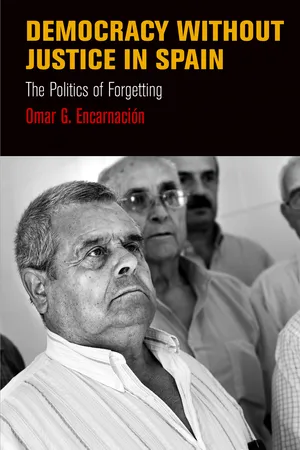
- 256 pages
- English
- PDF
- Available on iOS & Android
About This Book
Spain is a notable exception to the implicit rules of late twentieth-century democratization: after the death of General Francisco Franco in 1975, the recovering nation began to consolidate democracy without enacting any of the mechanisms promoted by the international transitional justice movement. There were no political trials, no truth and reconciliation commissions, no formal attributions of blame, and no apologies. Instead, Spain's national parties negotiated the Pact of Forgetting, an agreement intended to place the bloody Spanish Civil War and the authoritarian excesses of the Franco dictatorship firmly in the past, not to be revisited even in conversation. Formalized by an amnesty law in 1977, this agreement defies the conventional wisdom that considers retribution and reconciliation vital to rebuilding a stable nation. Although not without its dark side, such as the silence imposed upon the victims of the Civil War and the dictatorship, the Pact of Forgetting allowed for the peaceful emergence of a democratic state, one with remarkable political stability and even a reputation as a trailblazer for the national rights and protections of minority groups.Omar G. Encarnación examines the factors in Spanish political history that made the Pact of Forgetting possible, tracing the challenges and consequences of sustaining the agreement until its dramatic reversal with the 2007 Law of Historical Memory. The combined forces of a collective will to avoid revisiting the traumas of a difficult and painful past and the reliance on the reformed political institutions of the old regime to anchor the democratic transition created a climate conducive to forgetting. At the same time, the political movement to forget encouraged the embrace of a new national identity as a modern and democratic European state. Demonstrating the surprising compatibility of forgetting and democracy, Democratization Without Justice in Spain offers a crucial counterexample to the transitional justice movement. The refusal to confront and redress the past did not inhibit the rise of a successful democracy in Spain; on the contrary, by leaving the past behind, Spain chose not to repeat it.
Frequently asked questions
Information
Table of contents
- Cover
- Contents
- Introduction
- Chapter 1. History, Politics, and Forgetting in Spain
- Chapter 2. Regime Transition and the Rise of Forgetting, 1977–1981
- Chapter 3. Socialist Rule and the Years of “Disremembering,” 1982–1996
- Chapter 4. A Silent Accomplice: Civil Society and the Persistence of Forgetting
- Chapter 5. Pinochet’s Revenge: Awakening the Memory of War and Dictatorship
- Chapter 6. Post-Transitional Justice in Zapatero’s Second Transition
- Chapter 7. Coping with the Past: Spanish Lessons
- Notes
- References
- Index
- Acknowledgments